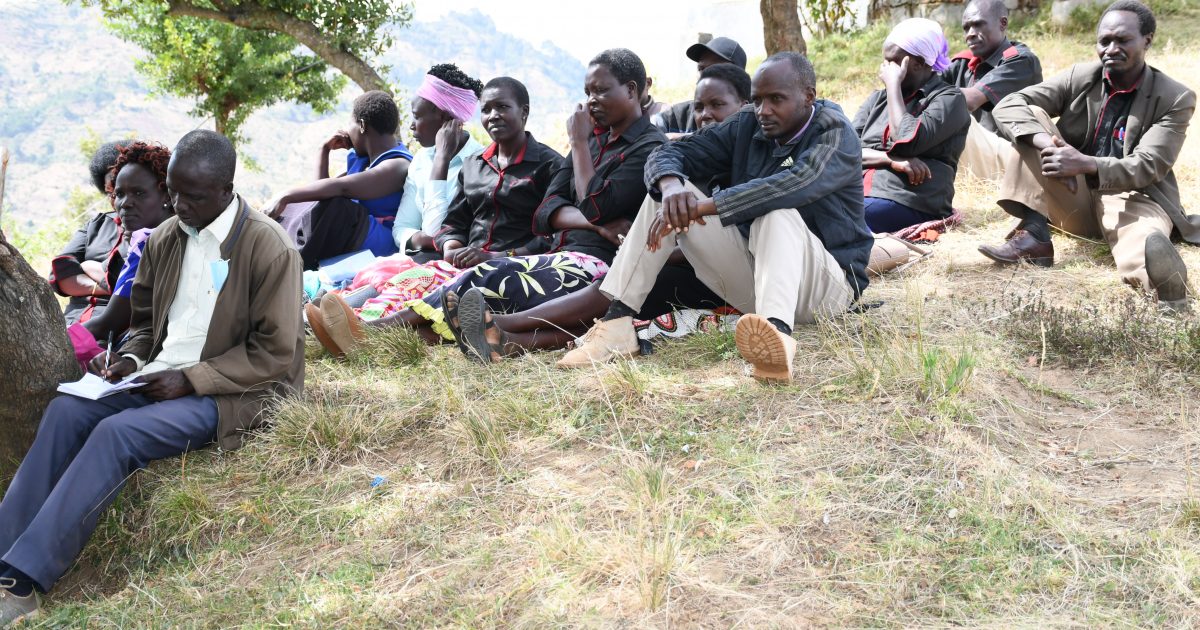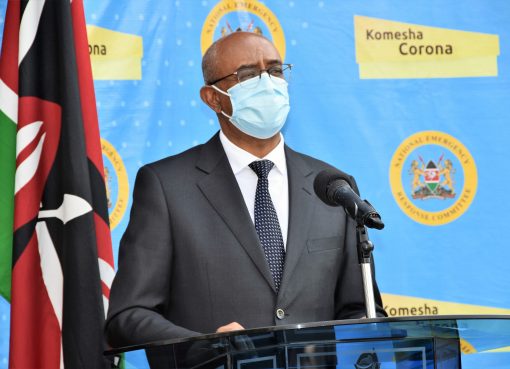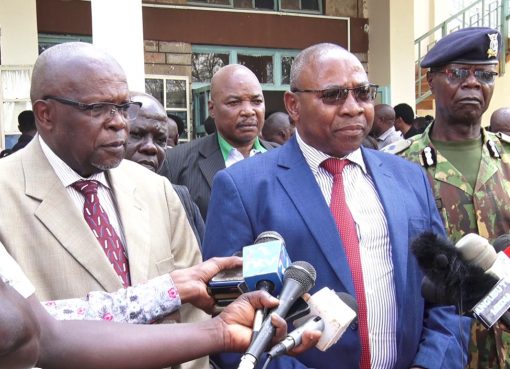Deep in the rural Kerio Valley, at the local Songeto dispensary in Tambach ward of Keiyo North Sub-County, a contractor was awarded a tender to supply 6-inch size mattresses for the dispensary’s maternity ward, but he delivered pieces of smaller size mattresses stitched together to make 6-inch mattresses, probably assuming, like what he may have done before or elsewhere, the delivery will be approved and he would get paid.
But he found out there were new rules of the game altogether, influenced by citizens themselves! And he learnt it the hard way. He got a rude shock when, after the facility management committee inspected the consignment, they rejected the delivered mattresses in totality and demanded for fresh supply of mattresses as specified in the Bill of Quantities at the tendering stage.

“He had no option but to comply and bring the quality of mattresses stipulated in the BQs because he cannot be paid unless citizens give a nod, and they would only give a nod when the right thing was done to the letter,” said Vincent Tanui, the chairman of Citizen Voice for Action (CVA) Tambach ward. CVA is helping citizens to take charge and the results are already showing.
At Anin dispensary, residents had through public participation allocated sh1 million in the 2018/19 financial year for the construction of a residential house for the medical personnel. The residents observed the shoddy work the contractor was doing and raised their voices about it leading to cancelling of the contract and discontinuation of the works.
In Kapsowar, residents had allocated sh2 million to purchase land for the expansion of Kaptoror dispensary, they were however surprised to find that the said funds had been diverted to purchasing of equipment.
“When we found out, we insisted that the funds should be reverted to their original use, which was done, but this didn’t go down well with the authorities who wondered how we got to know about it,” the chairman Kapsowar CVA Charles Kwambai said.
The chairman also cited the Kapchesewes dispensary where residents had allocated sh2 million for the construction of a permanent dispensary to replace the wooden building.
“When we came in, we found that sh500,000 of the money was missing, we asked for the money which was refunded and even had the contract cancelled and re-awarded to another contractor who was ready to work,” he said.
These are just some of the success stories of what citizens can do if they are fully involved in the governance of their affairs. They by extension can nip in the bud many cases of corruption where billions of shillings of taxpayer’s money are lost as reported year- in- year- out in the auditor general’s reports on counties since the inception of devolution.
As Tanui says, with proper monitoring and involvement in governance matters citizens have the power to address this issue where other institutions have failed.
However, the chairman says it is not easy to do this because corruption fights back and therefore one must be armed not only with technical documents but more importantly, the knowledge of the budget making process, in order to have water tight cases.
The constitution of Kenya has given citizens authority to run their affairs through public participation. According to Article 174 (c) the objectives of devolution are: to give powers of self-governance to the people and enhance their participation in the exercise of such powers in decision-making.
Article 174 (d) states that communities have the right to manage their own affairs and to further their development.
In line with this, the Elgeyo Marakwet county assembly passed the Equity Development Act (EDA) 2015 which stipulates that 60% of the development expenditure should go to each of the 20 wards with each ward getting an average of sh40 million annually.
Under EDA, wananchi come up with projects to be undertaken with funds being allocated according to the ceilings set by the county government. However, having the right laws in place is one thing and citizens being able to play their part effectively is another thing altogether. It is therefore imperative that someone goes an extra mile to equip citizens with knowledge on how they can take charge of their affairs.
As Kwambai says, there is need for citizens to beware of the budget preparation process, the tendering process and other technicalities involved for them to demand for what rightfully belongs to them in terms of projects funds allocation and implementation to the most satisfactory conclusion.
“This is what the World Vision set to do following the initiation of a programme known as Citizens Voice for Action (CVA),” said Kwambai.
According to the officer in charge of the programme at World Vision Boniface Mukosi, the organization trained some groups of citizens in some wards of the county to focus on the health and agricultural sector following the rampant cases of stunted growth among children aged 0-5 years in the county. Their effect has however been felt beyond just the two sectors.
According to the organization, cases of stunted growth among children aged between 0-5 years stands at 30% in Elgeyo Marakwet county against a national average of 19%.
In the five wards of Sambirir, Kapyego, Kapsowar, Tambach and Soy North where the CVA’s are active, the health sector has witnessed a huge improvement in the delivery of services with the wards even allocating funds for nutrition through public participation.
To gauge the level of service delivery when service providers were aware that citizens are watching, the CVA’s developed a questionnaire on service delivery which was filled by both the members of the public and health personnel.
“We wanted to know how long the members of the public take before they receive services in a health facility, monthly reports and resources at the disposal of the department of health personnel among others,” said Kwambai.
He said the fact that the health personnel know that the citizens are monitoring them has seen cases of absenteeism and reporting to work late reduce which has in turn resulted in great improvement in the delivery of services.
In Epke, which is situated along the Kerio escarpment, the Soy North CVA managed to petition the county government to establish a community health unit.
“For years, pregnant women would travel to Kaptarakwa dispensary in the highlands to get maternity services,” said the chairman, Nicholas Kiprono.
The other alternative for the pregnant mothers was to go down the steep slopes to Biretwo dispensary for them to perform the noble duty of bringing a life to the world.
As if the hilly terrain was not a problem enough, the place has no roads therefore, the best the women could get was a motor bike to take them to a health facility.
But thanks to the Citizens Voice for Action group in this ward who after the formation of the group embarked on a visit of all health facilities within the ward in 2018 to assess the challenges faced in the delivery of health services, women can now access maternity services.
The area is also populated by poisonous snakes whose bites result in deaths or permanent disability for the victims who survive the bites, the CVA wrote to the County and the facility was included among those supplied with anti-venom drugs.
“After seeing what we have done in the health sector, we have been approached by officers to expand our services to other sectors like roads and water something we hope to do in future,” Kiprono said.
The CVA’s also understand that for the health personnel to deliver, their welfare must be taken into consideration. In most of the health facilities, staff did not have houses, and where there were houses the security was poor while in some facilities staff used to share the same toilets with patients.
In realization that staff need to be motivated for them to work, they have not only ensured that the medical personnel have houses within the facility but also ensured that they have their own toilets. They have also ensured that staff houses are fenced to ensure they are secure because when they stay within the facilities, they can be able to respond faster to emergencies.
Apart from the two sectors, the CVA’s are spreading their wings to other sectors. For instance, in Kapcherop, they were able to intervene and have a contractor who was building the Kapcherop-Chesubet-Kamoi road provide a diversion after blocking the road with debris.
The CVA have also been acting as intermediaries between the community and the facilities.
They say that at first it was hard to deal with government officials who were not used to citizens demanding for information from them. But after witnessing the fruits of their work, they now use them to demand for some of the services from the county government.
They however say despite their hard work, they have been having challenges where most projects remain incomplete due to nonpayment of contractors, something they want the county to address.
In agriculture, very little has been done due to lack of personnel with many of the extension officers retiring with no replacement which they say will affect food security in the agricultural rich county.
By Alice Wanjiru





